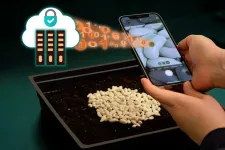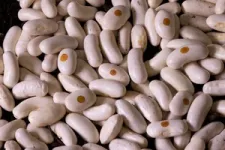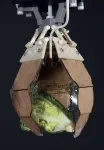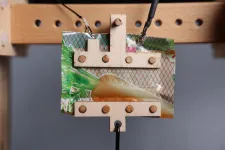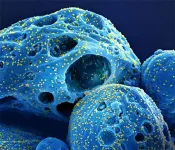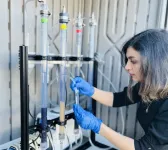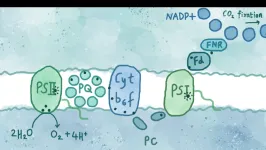(Press-News.org) Average crop yields in Africa are consistently far below expected, and one significant reason is the prevalence of counterfeit seeds whose germination rates are far lower than those of the genuine ones. The World Bank estimates that as much as half of all seeds sold in some African countries are fake, which could help to account for crop production that is far below potential.
There have been many attempts to prevent this counterfeiting through tracking labels, but none have proved effective; among other issues, such labels have been vulnerable to hacking because of the deterministic nature of their encoding systems. But now, a team of MIT researchers has come up with a kind of tiny, biodegradable tag that can be applied directly to the seeds themselves, and that provides a unique randomly created code that cannot be duplicated.
The new system, which uses minuscule dots of silk-based material, each containing a unique combination of different chemical signatures, is described today in the journal Science Advances in a paper by MIT’s dean of engineering Anantha Chandrakasan, professor of civil and environmental engineering Benedetto Marelli, postdoc Hui Sun, and graduate student Saurav Maji.
The problem of counterfeiting is an enormous one globally, the researchers point out, affecting everything from drugs to luxury goods, and many different systems have been developed to try to combat this. But there has been less attention to the problem in the area of agriculture, even though the consequences can be severe. In sub-Saharan Africa, for example, the World Bank estimates that counterfeit seeds are a significant factor in crop yields that average less than one-fifth of the potential for maize, and less than one-third for rice.
Marelli explains that a key to the new system is creating a randomly-produced physical object whose exact composition is virtually impossible to duplicate. The labels they create “leverage randomness and uncertainty in the process of application, to generate unique signature features that can be read, and that cannot be replicated,” he says.
What they’re dealing with, Sun adds, “is the very old job of trying, basically, not to get your stuff stolen. And you can try as much as you can, but eventually somebody is always smart enough to figure out how to do it, so nothing is really unbreakable. But the idea is, it’s almost impossible, if not impossible, to replicate it, or it takes so much effort that it’s not worth it anymore.”
The idea of an “unclonable” code was originally developed as a way of protecting the authenticity of computer chips, explains Chandrakasan, who is the Vannevar Bush Professor of Electrical Engineering and Computer Science. “In integrated circuits, individual transistors have slightly different properties coined device variations,” he explains, “and you could then use that variability and combine that variability with higher-level circuits to create a unique ID for the device. And once you have that, then you can use that unique ID as a part of a security protocol. Something like transistor variability is hard to replicate from device to device, so that's what gives it its uniqueness, versus storing a particular fixed ID.” The concept is based on what are known as physically unclonable functions, or PUFs.
The team decided to try to apply that PUF principle to the problem of fake seeds, and the use of silk proteins was a natural choice because the material is not only harmless to the environment but also classified by the Food and Drug Administration in the “generally recognized as safe” category, so it requires no special approval for use on food products.
“You could coat it on top of seeds,” Maji says, “and if you synthesize silk in a certain way, it will also have natural random variations. So that’s the idea, that every seed or every bag could have a unique signature.”
Developing effective secure system solutions have long been one of Chandrakasan’s specialties, while Marelli has spent many years developing systems for applying silk coatings to a variety of fruits, vegetables, and seeds, so their collaboration was a natural for developing such a silk-based coding system towards enhanced security.
“The challenge was what type of form factor to give to silk,” Sun says, “so that it can be fabricated very easily.” They developed a simple drop-casting approach that produces tags that are less than one-tenth of an inch in diameter. The second challenge was to develop “a way where we can read the uniqueness, in also a very high throughput and easy way.”
For the unique silk-based codes, Marelli says, “eventually we found a way to add a color to these microparticles so that they assemble in random structures.” The resulting unique patterns can be read out not only by a spectrograph or a portable microscope, but even by an ordinary cellphone camera with a macro lens. This image can be processed locally to generate the PUF code and then sent to the cloud and compared with a secure database to ensure the authenticity of the product. “It’s random so that people cannot easily replicate it,” says Sun. “People cannot predict it without measuring it.”
And the number of possible permutations that could result from the way they mix four basic types of colored silk nanoparticles is astronomical. “We were able to show that with a minimal amount of silk, we were able to generate 128 random bits of security,” Maji says. “So this gives rise to 2 to the power 128 possible combinations, which is extremely difficult to crack given the computational capabilities of the state-of-the-art computing systems.”
Marelli says that “for us, it’s a good test bed in order to think out-of-the-box, and how we can have a path that somehow is more democratic.” In this case, that means “something that you can literally read with your phone, and you can fabricate by simply drop casting a solution, without using any advanced manufacturing technique, without going in a clean room.”
Some additional work will be needed to make this a practical commercial product, Chandrakasan says. “There will have to be a development for at-scale reading” via smartphones. “So. that’s clearly a future opportunity.” But the principle now shows a clear path to the day when “a farmer could at least, maybe not every seed, but could maybe take some random seeds in a particular batch and verify them,” he says.
The research was partially supported by the U.S. Office of Naval research and the National Science Foundation, Analog Devices Inc., an EECS Mathworks fellowship, and a Paul M. Cook Career Development Professorship.
###
Written by David L. Chandler, MIT News Office
END
Tackling counterfeit seeds with “unclonable” labels
Fake seeds can cost farmers more than two-thirds of expected crop yields and threaten food security. Trackable silk labels could help
2023-03-22
ELSE PRESS RELEASES FROM THIS DATE:
Clearing a path for non-invasive muscle therapy for the elderly
2023-03-22
Clearing a path for non-invasive muscle therapy for the elderly
Controlling inflammation enables injured aged muscle recovery via non-invasive mechanical loading, offering promise for the future of mechanotherapies for elderly patients.
By Benjamin Boettner
(BOSTON) — Mechanotherapy, the concept of using mechanical forces to stimulate tissue healing, has been used for decades as a form of physical therapy to help heal injured muscles. However, the biological basis and optimal settings for mechanotherapies are still poorly understood, ...
Biodegradable artificial muscles: going green in the field of soft robotics
2023-03-22
Stuttgart, Linz, Boulder – Artificial muscles are a progressing technology that could one day enable robots to function like living organisms. Such muscles open up new possibilities for how robots can shape the world around us; from assistive wearable devices that can redefine our physical abilities at old age, to rescue robots that can navigate rubble in search of the missing. But just because artificial muscles can have a strong societal impact during use, doesn’t mean they have to leave a strong ...
UCLA Health Tip Sheet: Visual loss and mask-wearing practices; Influenza vaccination rates are low ; Mixed ancestry study provides clues to genetic traits;
2023-03-22
Below is a brief roundup of news and story ideas from the experts at UCLA Health. For more information on these stories or for help on other stories, please contact us at uclahealthnews@mednet.ucla.edu.
Journal scan
Mixed ancestry study provides clues to genetic traits A new multi-institutional study led by scientists at the Bioinformatics Interdepartmental Program at UCLA has found that individuals of mixed ancestry, such as African Americans, inherit a mosaic of ancestry segments from ...
Known active ingredient as new drug candidate against “monkeypox”
2023-03-22
Nitroxoline is the name of the new drug candidate that could potentially be used to treat mpox. It was identified by scientists at Goethe University and the University of Kent as part of a multi-site study. The results of their research will now allow clinical trials to begin soon.
The current mpox outbreak is the first of this size to occur outside of Africa and also the first mpox outbreak caused by human-to-human transmission. People with immunodeficiencies are particularly at risk from the disease. Although antiviral agents have already been shown to inhibit the replication ...
Why subvariants of the SARS-CoV-2 virus accelerated the pandemic
2023-03-22
The COVID-19 pandemic has killed nearly 7 million people worldwide (1.1 million in the United States) and severely harmed many millions more, though vaccines and antiviral treatments measurably reduced the potential loss of life and health.
A Commonwealth Fund report, for example, estimated COVID-19 vaccines alone prevented more than 18 million additional hospitalizations and 3.2 million additional deaths in the U.S.
The pandemic has never been simple or easy. For example, the emergence of viral variants, in particular recent versions of the Omicron, fueled new surges of infection and disease throughout 2022 and into 2023.
“There were real concerns ...
Semiconductor lattice marries electrons and magnetic moments
2023-03-22
ITHACA, N.Y. -- A model system created by stacking a pair of monolayer semiconductors is giving physicists a simpler way to study confounding quantum behavior, from heavy fermions to exotic quantum phase transitions.
The group’s paper, “Gate-Tunable Heavy Fermions in a Moiré Kondo Lattice,” published March 15 in Nature. The lead author is postdoctoral fellow Wenjin Zhao in the Kavli Institute at Cornell.
The project was led by Kin Fai Mak, professor of physics in the College of Arts and Sciences, and Jie Shan, professor of applied and engineering physics in Cornell Engineering ...
Nominations sought for 2024 Watanabe Prize in Translational Research
2023-03-22
Indiana University School of Medicine is accepting nominations until May 1 for the 2024 August M. Watanabe Prize in Translational Research.
The Watanabe Prize is one of the nation’s largest and most prestigious research awards recognizing senior investigators focused on shepherding scientific discoveries into new therapies for patients. Nominees should be members of the scientific or medical communities who have demonstrated outstanding accomplishments in translational research.
The winner will receive $100,000 and will spend Sept. 18-20, 2024, in Indianapolis as a vising dignitary, sharing insights and knowledge with audiences at IU School of Medicine and its partner institutions. ...
Dr. Ekta Khurana receives grant to study prostate cancer evolution
2023-03-22
Dr. Ekta Khurana, an associate professor of physiology and biophysics at Weill Cornell Medicine, has received a 3-year, $1.2 million grant from the United States Department of Defense to investigate how prostate cancer cells evolve to become resistant to hormone-blocking therapy. This work will contribute to further understanding prostate cancer and the development of effective targeted therapies for the disease.
Prostate cancer growth is dependent on androgens – male hormones such as testosterone – binding ...
New UBC water treatment zaps ‘forever chemicals’ for good
2023-03-22
Engineers at the University of British Columbia have developed a new water treatment that removes “forever chemicals” from drinking water safely, efficiently – and for good.
“Think Brita filter, but a thousand times better,” says UBC chemical and biological engineering professor Dr. Madjid Mohseni, who developed the technology.
Forever chemicals, formally known as PFAS (per-and polyfluoroalkyl substances) are a large group of substances that make certain products non-stick or stain-resistant. There are more than ...
Photosynthesis ‘hack’ could lead to new ways of generating renewable energy
2023-03-22
Researchers have ‘hacked’ the earliest stages of photosynthesis, the natural machine that powers the vast majority of life on Earth, and discovered new ways to extract energy from the process, a finding that could lead to new ways of generating clean fuel and renewable energy.
An international team of physicists, chemists and biologists, led by the University of Cambridge, was able to study photosynthesis – the process by which plants, algae and some bacteria convert sunlight into energy – ...
LAST 30 PRESS RELEASES:
Improved short-term sea level change predictions with better AI training
UAlbany researchers develop new laser technique to test mRNA-based therapeutics
New water-treatment system removes nitrogen, phosphorus from farm tile drainage
Major Canadian study finds strong link between cannabis, anxiety and depression
New discovery of younger Ediacaran biota
Lymphovenous bypass: Potential surgical treatment for Alzheimer's disease?
When safety starts with a text message
CSIC develops an antibody that protects immune system cells in vitro from a dangerous hospital-acquired bacterium
New study challenges assumptions behind Africa’s Green Revolution efforts and calls for farmer-centered development models
Immune cells link lactation to long-lasting health
Evolution: Ancient mosquitoes developed a taste for early hominins
Pickleball players’ reported use of protective eyewear
Changes in organ donation after circulatory death in the US
Fertility preservation in people with cancer
A universal 'instruction manual' helps immune cells protect our organs
Fifteen-year results from SWOG S0016 trial suggest follicular lymphoma is curable
The breasts of a breastfeeding mother may protect a newborn from the cold – researchers offer a new perspective on breast evolution
More organ donations now come from people who die after their heart stops beating
How stepping into nature affects the brain
Study: Cancer’s clues in the bloodstream reveal the role androgen receptor alterations play in metastatic prostate cancer
FAU Harbor Branch awarded $900,000 for Gulf of America sea-level research
Terminal ileum intubation and biopsy in routine colonoscopy practice
Researchers find important clue to healthy heartbeats
Characteristic genomic and clinicopathologic landscape of DNA polymerase epsilon mutant colorectal adenocarcinomas
Start school later, sleep longer, learn better
Many nations underestimate greenhouse emissions from wastewater systems, but the lapse is fixable
The Lancet: New weight loss pill leads to greater blood sugar control and weight loss for people with diabetes than current oral GLP-1, phase 3 trial finds
Pediatric investigation study highlights two-way association between teen fitness and confidence
Researchers develop cognitive tool kit enabling early Alzheimer's detection in Mandarin Chinese
New book captures hidden toll of immigration enforcement on families
[Press-News.org] Tackling counterfeit seeds with “unclonable” labelsFake seeds can cost farmers more than two-thirds of expected crop yields and threaten food security. Trackable silk labels could help
